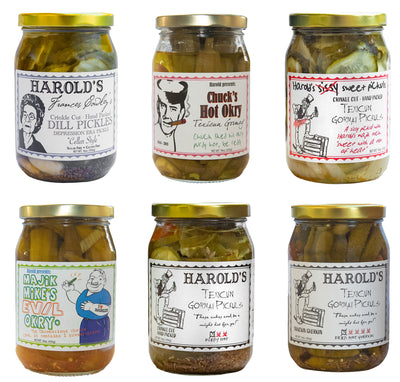What Makes Artisan Pickles Different?
Artisan pickles stand out because they are crafted with care in small batches, using high-quality ingredients and slow pickling techniques. Unlike mass-produced pickles, which prioritize speed, affordability, and consistency, artisan varieties offer bold flavors and natural preservation methods, often appealing to those seeking unique taste experiences and fewer additives.
Key Differences:
- Production: Artisan pickles are made in small batches with hands-on oversight; mass-produced pickles rely on automated, high-speed processes.
- Ingredients: Artisan makers use premium produce and natural seasonings, while mass-produced options prioritize cost-effective, standardized ingredients.
- Techniques: Artisan pickles often rely on slow fermentation, enhancing flavor and probiotics. Mass-produced pickles use quick pickling with preservatives.
- Flavors: Artisan options are bold and varied, reflecting regional influences. Mass-produced pickles stick to familiar, uniform tastes.
- Health: Artisan pickles avoid artificial additives, offering natural benefits. Mass-produced pickles often contain preservatives and higher sodium levels.
- Price & Availability: Artisan pickles cost more and are harder to find, while mass-produced pickles are affordable and widely available.
Quick Comparison:
| Factor | Artisan Pickles | Mass-Produced Pickles |
|---|---|---|
| Production | Small-batch, hands-on | High-volume, automated |
| Ingredients | High-quality, locally sourced | Cost-effective, standardized |
| Techniques | Slow fermentation | Quick pickling, preservatives |
| Flavors | Bold, varied, regional | Uniform, familiar |
| Health | Fewer additives, natural probiotics | More sodium, artificial additives |
| Price | Higher | Lower |
| Availability | Limited | Widely available |
Artisan pickles are ideal for those who value flavor and quality, while mass-produced pickles serve as a convenient, budget-friendly option.
1. Artisan Pickles
Production Scale
Artisan pickle makers focus on small-batch production, steering clear of the industrial approach. This method allows them to oversee every step of the process - from hand-selecting ingredients to meticulously packing jars. It also gives them the freedom to tweak recipes as needed, ensuring each batch meets their high standards. Achieving this kind of precision and care is nearly impossible in large-scale manufacturing, making small-batch production a cornerstone of artisan pickling.
Ingredient Quality
The secret to artisan pickles lies in the quality of their ingredients. Makers often partner with local farms to source produce known for its exceptional flavor. They also prioritize naturally sourced seasonings and vinegars, which contribute to a richer and more genuine taste. For example, Harold's Texicun Gormay Pickuls is famous for its bold, spicy flavor, crafted using carefully chosen, high-quality ingredients. Similarly, Chuck's Hot Okry delivers a fiery habanero kick, showcasing the attention to detail that defines artisan pickling.
Pickling Techniques
Artisan producers rely on traditional fermentation techniques to bring out the best in their ingredients. These time-tested methods, which can take weeks or even months, create complex flavors while naturally producing probiotics. Some makers also experiment with unconventional methods, like using beer in the brine. Take The Original Beer Pickle, for example - it uses a beer-infused process to achieve a spicy, garlic-forward flavor with added depth. This kind of creativity thrives in small-batch settings, where there’s room to innovate.
Flavor Profiles
Artisan pickles stand out for their bold and unique flavors, often shaped by regional influences and the creativity of their makers. Instead of sticking to standardized recipes, artisans develop signature combinations that make their pickles memorable. For a classic option, Francis Cowley's Dill Pickles offers simple, traditional flavors. On the other hand, Harold's Texicun Gormay Pickuls takes a more adventurous route with its inventive spice blends. The extended aging process and layered seasonings create a flavor experience that evolves with every bite.
Health Benefits
Unlike mass-produced pickles, artisan varieties are typically made with fewer preservatives and additives. They rely on natural preservation techniques and carefully balanced acidity levels, appealing to health-conscious consumers looking for a snack that’s both wholesome and flavorful.
Through their dedication to quality, creativity, and tradition, artisan pickles offer a taste experience that’s hard to match. Their small-batch approach ensures every jar is packed with care and rich, complex flavors.
2. Mass-Produced Pickles
Mass-produced pickles take a very different approach compared to the handcrafted care of artisan varieties. Here, the focus shifts toward speed, efficiency, and consistency.
Production Scale
In large-scale facilities, pickles are churned out on high-speed assembly lines capable of processing thousands of jars every hour. While this method ensures a steady supply for supermarkets, it sacrifices the detailed attention that smaller batches receive. Quality control is based on sampling rather than hands-on oversight, and once recipes are set, they’re rarely adjusted. The result? A product that's consistent but lacks the personal touch that defines artisan pickling.
Ingredient Quality
When it comes to ingredients, cost takes precedence. Cucumbers are typically sourced from large-scale farms that prioritize uniformity in size and durability over flavor. Vinegars used in these pickles are often basic white or distilled types, chosen for their neutral taste and long shelf life. This approach creates pickles with a familiar but somewhat flat flavor profile, missing the richness and complexity found in small-batch alternatives.
Pickling Techniques
Rather than relying on slow, traditional fermentation, mass producers use quick pickling techniques. This involves steeping cucumbers in concentrated vinegar mixed with preservatives, speeding up the process significantly. While this method is great for extending shelf life and meeting safety standards, it bypasses the gradual flavor development that makes traditionally fermented pickles so distinctive.
Flavor Profiles
The flavor options for mass-produced pickles are highly standardized. Popular choices like dill, sweet, and bread-and-butter styles dominate the shelves, offering a predictable taste experience. While this consistency appeals to broad markets, it leaves little room for the bold flavor combinations or regional influences that make artisan pickles stand out. The result is a safe, familiar flavor - reliable but often lacking in complexity or creativity.
Health Benefits
Mass-produced pickles often rely on preservatives and additives to maintain their appearance and extend shelf life during lengthy distribution chains. Ingredients like calcium chloride keep pickles crisp, while artificial colors enhance their visual appeal. Stabilizers prevent separation, and salt is often used liberally as a cheap way to boost flavor. Unfortunately, these pickles lack the natural probiotics found in slow-fermented varieties, and the higher levels of sodium and chemical additives may give health-conscious consumers pause. For those seeking a more natural option, these pickles might not be the best choice.
sbb-itb-820fb79
Advantages and Disadvantages
When it comes to artisan versus mass-produced pickles, each offers its own set of perks and challenges.
Artisan pickles stand out for their bold, unique flavors and high-quality ingredients, thanks to their small-batch, hand-crafted nature. These pickles are particularly appealing to health-conscious individuals, as they often rely on traditional fermentation methods, which naturally boost probiotics and avoid artificial preservatives.
That said, artisan pickles come with a higher price tag due to their labor-intensive production. They’re also harder to find, typically sold in specialty stores or farmers markets, and their shorter shelf life requires quicker consumption - making them less convenient for everyday use.
On the other hand, mass-produced pickles focus on consistency and convenience. These pickles are widely available in mainstream grocery stores, making them an easy choice for everyday shoppers. They’re also more budget-friendly and have a longer shelf life, making them practical for households. However, the trade-off is in flavor and quality - mass-produced pickles often use standard ingredients and additives, leading to a less complex, one-note taste. They also rely on chemical preservatives and can be higher in sodium.
Here’s a quick breakdown of the key differences:
| Factor | Artisan Pickles | Mass-Produced Pickles |
|---|---|---|
| Production Scale | Small batches, hand-crafted | High-volume, automated |
| Ingredient Quality | Premium produce and specialty vinegars | Standard, cost-focused ingredients |
| Flavor Complexity | Unique, nuanced profiles | Standardized, familiar flavors |
| Pricing | Higher price | More affordable |
| Availability | Limited to specialty outlets | Widely available in grocery stores |
| Shelf Life | Shorter, naturally preserved | Longer with chemical preservation |
| Health Benefits | Natural probiotics, fewer additives | Often higher sodium, artificial additives |
| Consistency | Variations between batches | Highly uniform |
Final Thoughts
When it comes to choosing between artisan and mass-produced pickles, it really depends on what you value most. Artisan pickles focus on quality and craftsmanship, offering rich, complex flavors, high-quality ingredients, and natural fermentation methods. If you're someone who appreciates distinctive tastes and is willing to spend a bit more, artisan pickles provide a standout experience along with some real health perks.
On the other hand, mass-produced pickles are all about convenience and affordability. They're perfect for large gatherings or when you need something reliable and easy to find at your local grocery store. They get the job done for everyday snacking or meal prep without breaking the bank.
The growing interest in artisan pickles highlights a larger shift in how people think about food - many are looking for premium experiences and transparency about ingredients. This trend shows there's room for both options: artisan pickles for special occasions or adventurous palates, and mass-produced ones for practical, everyday use.
Ultimately, your choice boils down to your priorities - whether it's flavor, health, convenience, or cost. The great news? Both artisan and mass-produced pickles are evolving. Artisan makers continue to experiment with bold, creative flavors, while larger brands are stepping up with cleaner ingredients and better taste profiles to meet changing consumer expectations.
FAQs
What are the health benefits of eating artisan pickles compared to store-bought ones?
Artisan pickles come with some impressive health perks that make them stand out from their store-bought counterparts. For starters, they’re often made using traditional fermentation techniques. This process creates probiotics - the friendly bacteria that play a big role in keeping your gut healthy, aiding digestion, and even giving your immune system a boost. On the flip side, many mass-produced pickles go through pasteurization, which wipes out these beneficial live cultures.
Another plus? Artisan pickles are usually made with natural, high-quality ingredients, meaning they can pack in more nutrients like potassium, calcium, and vitamins. They’re also less likely to include artificial additives, making them a better option for anyone aiming to stick to clean eating and enjoy authentic, natural flavors.
What makes artisan pickles more flavorful and healthier than regular pickles?
Artisan pickles are crafted through natural fermentation, where vegetables are submerged in a saltwater brine and kept at temperatures between 64°F and 72°F. This environment promotes the growth of Lactobacillus and other friendly bacteria, giving the pickles their tangy, layered flavor while also increasing their probiotic content, which is known to support digestion and gut health.
Because artisan pickles are made with raw, uncooked vegetables, the probiotics stay alive and active, making them both a delicious and gut-friendly option. Their small-batch production and focus on top-notch ingredients add to their distinctive flavor and nutritional value.
Why are artisan pickles more expensive and harder to find than regular store-bought pickles?
Artisan pickles often come with a higher price tag and are harder to find because they’re made in small batches with top-notch ingredients. These ingredients are typically organic or locally sourced, which naturally drives up production costs. On top of that, the pickling process itself is more involved - whether it’s sticking to traditional methods or experimenting with creative techniques, it takes more time and hands-on effort compared to mass production.
Because these pickles are produced in limited quantities, you’re less likely to see them stocked in big grocery chains. Instead, they’re commonly found at specialty stores, farmers' markets, or sold directly by the makers. Their combination of premium ingredients, labor-intensive processes, and exclusivity sets them apart as a specialty product, offering something unique compared to the standard, mass-produced varieties.



Leave a comment